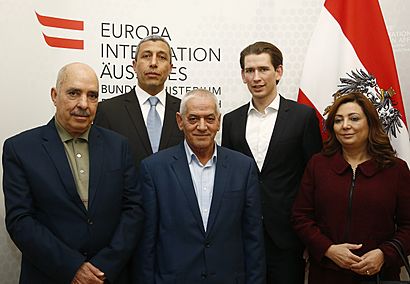Tunisian National Dialogue Quartet facts for kids
Quick facts for kids Tunisian National Dialogue Quartet |
||||
|---|---|---|---|---|
| Part of the aftermath of the Jasmine Revolution | ||||

The Tunisian National Dialogue Quartet visiting Vienna in March 2016. From left to right: Abdessattar Ben Moussa, Noureddhine Allege, Houcine Abbassi, and Wided Bouchamaoui.
|
||||
| Date | Formed August 2013-January 2014 | |||
| Location | ||||
| Goals |
|
|||
| Resulted in |
|
|||
| Parties to the civil conflict | ||||
|
||||
| Lead figures | ||||
|---|---|---|---|---|
|
||||
The Tunisian National Dialogue Quartet is a group of four important organizations from Tunisia. They came together to help their country build a democracy after the Tunisian Revolution in 2011, also known as the Jasmine Revolution.
The Quartet was formed in the summer of 2013. At the time, Tunisia was facing a major political crisis that had stopped the creation of a new constitution. The Quartet successfully brought the government and other political groups together to talk and find a solution.
Because of their amazing work, the Quartet was awarded the 2015 Nobel Peace Prize.
Contents
Who is in the Quartet?
The National Dialogue Quartet is made up of four groups from what is called "civil society." These are groups of citizens, not the government, who work for the good of the public.
The four groups are:
- The Tunisian General Labour Union (UGTT): A group that represents and helps workers.
- The Tunisian Confederation of Industry, Trade and Handicrafts (UTICA): A group that represents business owners and companies.
- The Tunisian Human Rights League (LTDH): A group that works to protect the rights of all people.
- The Tunisian Order of Lawyers: A group that represents lawyers in the country.
Why Was the Quartet Needed?
After the Revolution
In 2011, the people of Tunisia protested for more freedom and a new government. This was called the Tunisian Revolution. After the country's longtime leader, Zine El Abidine Ben Ali, left power, Tunisia began its journey toward democracy.
However, building a new government was difficult. The leading political party, Ennahda, had to share power with other parties. They often disagreed on how the country should be run and what should be in the new constitution, which is the main rulebook for a country. Many people worried that the new government was trying to make the country's laws based too much on religion.
A Country in Crisis
The situation became much worse in 2013 when two important opposition leaders, Chokri Belaid and Mohamed Brahmi, were killed. These events shocked the country and led to huge protests.
Many people blamed the government for not protecting these leaders. The opposition parties were so upset that they left the group that was writing the new constitution. It seemed like the country was on the brink of a major conflict. The process of creating a new democracy had come to a complete stop.
How Did the Quartet Bring Peace?
Seeing that their country was in trouble, the four civil society groups decided to step in. They formed the Quartet to act as neutral peacemakers. Their goal was to get all the political parties to sit down and talk to each other again.
The Quartet created a "roadmap" for peace. This was a clear plan with four main goals:
- Choose a temporary government of experts who were not involved in the political fights.
- Set a date for new elections so the people could choose their leaders.
- Create a fair commission to oversee the elections.
- Finish writing and approve the new constitution.
The Quartet hosted meetings where they made sure the political leaders stayed and worked until they reached an agreement. The leader of the UGTT, Houcine Abassi, was especially important in pushing the process forward.
What Did the Quartet Achieve?
The Quartet's hard work paid off. The political parties agreed to the roadmap. A temporary government, led by Mehdi Jomaa, was put in place to guide the country.
Most importantly, the new Tunisian Constitution was finally finished and approved in January 2014. This new constitution was celebrated for protecting rights and freedoms for all Tunisians.
Later that year, Tunisia held successful elections for a new parliament and a new president. The country had successfully moved from crisis to a peaceful democracy, thanks to the Quartet.
Winning the Nobel Peace Prize
On October 9, 2015, the world recognized the Quartet's incredible achievement. They were awarded the 2015 Nobel Peace Prize.
The Nobel Committee praised the group "for its decisive contribution to the building of a pluralistic democracy in Tunisia." The committee said the Quartet created a "peaceful political process at a time when the country was on the brink of civil war."
World leaders also celebrated the news.
- U.S. President Barack Obama called the Quartet "an inspiring reminder that lasting peace and security can only be achieved when citizens are empowered to forge their own future."
- German Chancellor Angela Merkel said the prize was a "deserved reward for working on democracy."
- The United Nations Secretary-General Ban Ki-moon said the award showed that "lasting progress requires an inclusive process."
The Quartet's Lasting Impact
The Quartet's success left a lasting legacy in Tunisia. The new constitution they helped create is one of the most progressive in the Arab world. For example, it guarantees the right for workers to strike and form unions, a major victory for the UGTT.
The Quartet also showed how important civil society can be. They proved that when citizens work together, they can solve even the biggest political problems and lead their country to a better future.
See also
 In Spanish: Cuarteto para el Diálogo Nacional Tunecino para niños
In Spanish: Cuarteto para el Diálogo Nacional Tunecino para niños
 | William M. Jackson |
 | Juan E. Gilbert |
 | Neil deGrasse Tyson |

